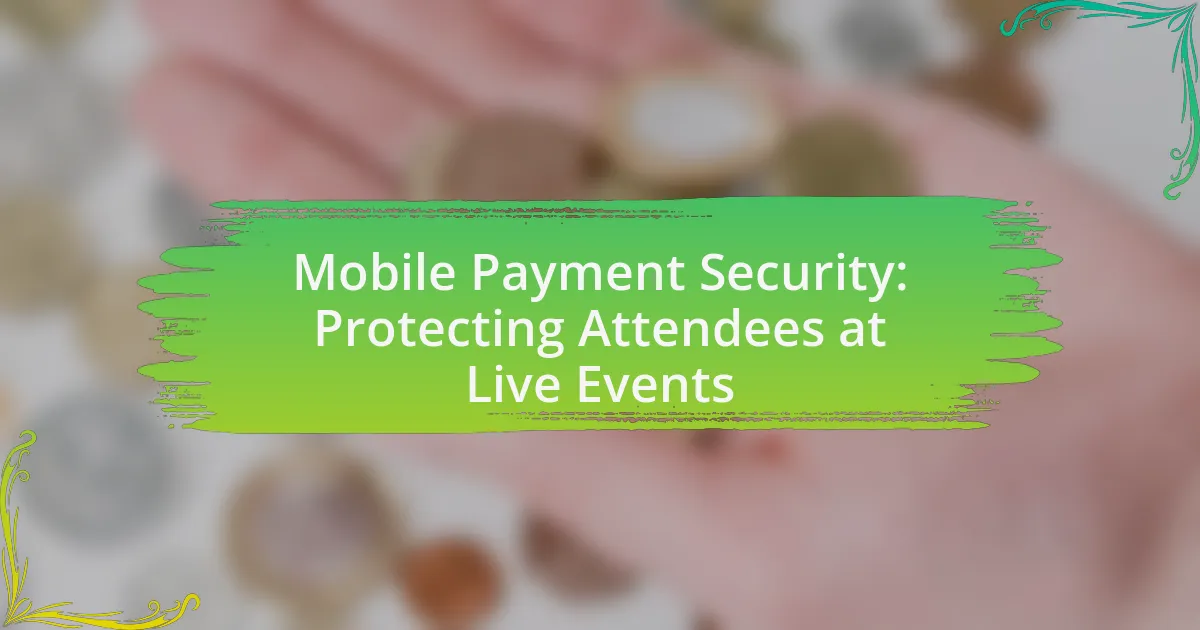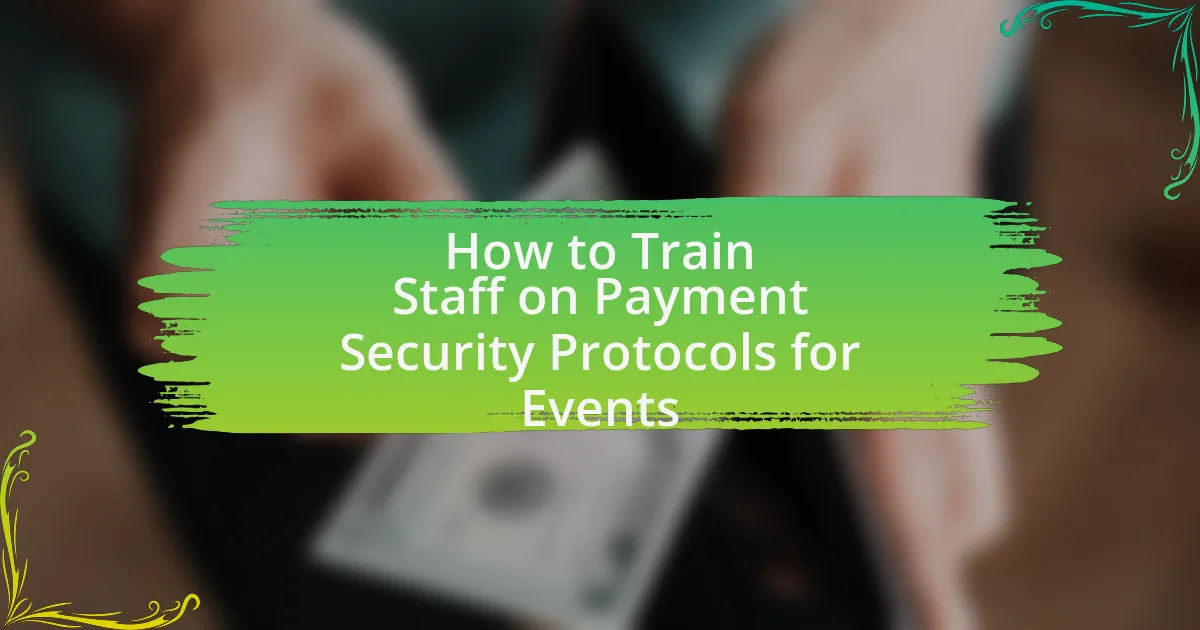A secure payment gateway is a critical technology for event organizers, facilitating online payment processing while protecting sensitive financial information through encryption and compliance with industry standards like PCI DSS. This article outlines the functionality of secure payment gateways, their key components, and the importance of selecting a reliable provider to mitigate risks associated with insecure gateways. It also discusses factors to consider when choosing a payment gateway, including security features, transaction fees, and customer support, while emphasizing best practices for integration to enhance user experience and trust.
What is a Secure Payment Gateway for Your Event?

A secure payment gateway for your event is a technology that facilitates the processing of online payments while ensuring the protection of sensitive financial information. This type of gateway encrypts data during transmission, safeguarding it from unauthorized access and fraud. For instance, according to the Payment Card Industry Data Security Standard (PCI DSS), secure payment gateways must comply with strict security measures to protect cardholder data, which includes encryption and secure data storage. By utilizing a secure payment gateway, event organizers can provide a safe transaction environment for attendees, thereby enhancing trust and potentially increasing ticket sales.
How does a secure payment gateway function?
A secure payment gateway functions by encrypting sensitive payment information during transactions to protect it from unauthorized access. When a customer initiates a payment, the gateway captures the payment details, such as credit card numbers, and encrypts this data using secure protocols like SSL (Secure Socket Layer). This encrypted information is then transmitted to the payment processor for authorization.
Once the payment processor verifies the transaction, it sends a response back through the gateway, which then communicates the result to the merchant and the customer. This process ensures that sensitive data remains confidential and secure throughout the transaction, minimizing the risk of fraud and data breaches. The use of encryption and secure protocols is a standard practice in the industry, as evidenced by the widespread adoption of PCI DSS (Payment Card Industry Data Security Standard) compliance among payment gateways.
What are the key components of a secure payment gateway?
The key components of a secure payment gateway include encryption, authentication, fraud detection, and compliance with industry standards. Encryption protects sensitive data during transmission, ensuring that information such as credit card numbers is securely encoded. Authentication verifies the identity of users and merchants, preventing unauthorized access. Fraud detection systems analyze transaction patterns to identify and mitigate potential fraudulent activities. Compliance with standards such as PCI DSS (Payment Card Industry Data Security Standard) ensures that the payment gateway adheres to security protocols designed to protect cardholder data. These components collectively enhance the security and reliability of online transactions.
How do these components ensure transaction security?
Components such as encryption, tokenization, and secure protocols ensure transaction security by protecting sensitive data during transmission and storage. Encryption scrambles data, making it unreadable to unauthorized users, while tokenization replaces sensitive information with unique identifiers, reducing the risk of data breaches. Secure protocols, like HTTPS, establish a secure connection between the user and the payment gateway, preventing interception of data. These methods collectively safeguard transaction integrity and confidentiality, thereby enhancing overall security in payment processing.
Why is choosing a secure payment gateway important for events?
Choosing a secure payment gateway is crucial for events because it protects sensitive financial information from fraud and data breaches. Events often handle large volumes of transactions, making them attractive targets for cybercriminals. A secure payment gateway employs encryption and compliance with standards such as PCI DSS (Payment Card Industry Data Security Standard), which significantly reduces the risk of unauthorized access to payment data. According to a 2021 report by Cybersecurity Ventures, cybercrime is projected to cost the world $10.5 trillion annually by 2025, highlighting the importance of robust security measures in financial transactions.
What risks are associated with insecure payment gateways?
Insecure payment gateways expose businesses and consumers to significant risks, including data breaches, fraud, and financial loss. These gateways can be vulnerable to cyberattacks, where hackers exploit weaknesses to gain unauthorized access to sensitive information such as credit card details and personal data. According to a report by Verizon, 39% of data breaches involve payment card information, highlighting the critical need for secure payment processing. Additionally, insecure gateways can lead to chargebacks and reputational damage, as customers may lose trust in a business that fails to protect their financial information.
How can a secure payment gateway enhance attendee trust?
A secure payment gateway enhances attendee trust by ensuring the safety of their financial information during transactions. When attendees perceive that their sensitive data is protected through encryption and compliance with security standards, such as PCI DSS, they are more likely to engage with the event. Research indicates that 70% of consumers are more likely to complete a purchase when they feel their payment information is secure. This trust is further reinforced by visible security features, such as trust seals and clear privacy policies, which communicate a commitment to safeguarding user data.
What factors should you consider when selecting a secure payment gateway?

When selecting a secure payment gateway, consider factors such as security features, transaction fees, integration capabilities, and customer support. Security features should include encryption, fraud detection, and compliance with standards like PCI DSS, which ensures that sensitive payment information is protected. Transaction fees can vary significantly between gateways, impacting overall costs, so it’s essential to evaluate these fees in relation to your expected transaction volume. Integration capabilities with your existing systems or e-commerce platforms are crucial for seamless operations. Lastly, reliable customer support is vital for resolving issues quickly, ensuring that your payment processing runs smoothly.
How do transaction fees impact your choice of payment gateway?
Transaction fees significantly influence the selection of a payment gateway by directly affecting the overall cost of transactions. Higher transaction fees can reduce profit margins for businesses, making it essential to choose a gateway that offers competitive rates. For instance, if a payment gateway charges 3% per transaction, a business processing $10,000 in sales would incur $300 in fees, which could be substantial for smaller events. Conversely, a gateway with lower fees, such as 1.5%, would only cost $150 for the same sales volume, allowing more funds to be allocated to other event expenses. Therefore, evaluating transaction fees is crucial for ensuring financial viability and maximizing revenue when selecting a payment gateway.
What are the typical fee structures for payment gateways?
Typical fee structures for payment gateways include transaction fees, monthly fees, and setup fees. Transaction fees are usually a percentage of the transaction amount, often ranging from 1.5% to 3.5%, plus a fixed fee per transaction, which can be around $0.10 to $0.30. Monthly fees may be charged for account maintenance and can vary from $0 to $50, depending on the provider. Setup fees, which are less common, can range from $0 to several hundred dollars, depending on the complexity of the integration. These fee structures can vary significantly based on the payment gateway provider and the specific services offered.
How can you calculate the total cost of using a payment gateway?
To calculate the total cost of using a payment gateway, you need to consider several key components: transaction fees, monthly fees, setup fees, and any additional charges such as chargeback fees or currency conversion fees. Transaction fees typically range from 1.5% to 3.5% per transaction, depending on the provider and the volume of transactions. Monthly fees can vary from $0 to $50 or more, depending on the service level and features offered. Setup fees may be a one-time charge, often between $0 and $500. Additional charges, such as chargeback fees, can be around $15 to $25 per incident. By summing these costs based on your expected transaction volume and frequency, you can arrive at an accurate estimate of the total cost associated with using a specific payment gateway.
What security features should a payment gateway offer?
A payment gateway should offer robust security features such as encryption, tokenization, and fraud detection. Encryption protects sensitive data during transmission, ensuring that information like credit card numbers is secure from interception. Tokenization replaces sensitive data with unique identifiers, minimizing the risk of data breaches. Additionally, advanced fraud detection systems analyze transaction patterns to identify and prevent fraudulent activities in real-time. These features are essential for maintaining customer trust and complying with industry standards like PCI DSS, which mandates strict security measures for handling payment information.
How does encryption protect sensitive payment information?
Encryption protects sensitive payment information by converting it into a coded format that can only be read by authorized parties. This process ensures that even if data is intercepted during transmission, it remains unreadable and secure from unauthorized access. For instance, the use of Advanced Encryption Standard (AES) is a widely recognized method that encrypts data, making it nearly impossible for cybercriminals to decipher without the correct decryption key. According to the National Institute of Standards and Technology (NIST), encryption is a critical component in safeguarding sensitive information, as it significantly reduces the risk of data breaches and fraud in financial transactions.
What role does PCI compliance play in payment gateway security?
PCI compliance is essential for ensuring payment gateway security as it establishes a set of standards designed to protect cardholder data during transactions. These standards, set by the Payment Card Industry Security Standards Council, require payment gateways to implement robust security measures, including encryption, access controls, and regular security testing. Compliance with these standards significantly reduces the risk of data breaches and fraud, as evidenced by the fact that organizations adhering to PCI compliance experience fewer security incidents compared to those that do not.
How can you evaluate the reliability of a payment gateway?

To evaluate the reliability of a payment gateway, assess its security features, transaction success rates, and customer support responsiveness. Security features should include encryption protocols like SSL and compliance with standards such as PCI DSS, which ensures that sensitive payment information is protected. High transaction success rates indicate that the gateway effectively processes payments without frequent failures, which is crucial for maintaining customer trust. Additionally, responsive customer support is essential for resolving issues quickly, as delays can lead to lost sales and dissatisfaction. According to a 2021 report by Statista, 43% of consumers abandon their purchases due to payment issues, highlighting the importance of reliability in payment processing.
What are the indicators of a reputable payment gateway provider?
A reputable payment gateway provider is indicated by strong security measures, transparent fee structures, and excellent customer support. Security measures include compliance with PCI DSS standards, which ensure that sensitive payment information is handled securely. Transparent fee structures allow businesses to understand all costs involved, avoiding hidden fees that can affect profitability. Excellent customer support is crucial, as it ensures that any issues can be resolved quickly, maintaining trust and reliability in the service. Additionally, positive reviews and a solid reputation in the industry further reinforce the credibility of a payment gateway provider.
How can customer reviews and testimonials inform your decision?
Customer reviews and testimonials can significantly inform your decision by providing insights into the experiences of others with a specific payment gateway. These reviews often highlight the reliability, security features, and customer service quality of the gateway, which are critical factors when selecting a secure payment solution for your event. For instance, a study by BrightLocal found that 91% of consumers read online reviews regularly, and 84% trust them as much as personal recommendations. This data underscores the importance of customer feedback in shaping perceptions and guiding choices in payment gateway selection.
What certifications should you look for in a payment gateway?
When selecting a payment gateway, look for certifications such as PCI DSS (Payment Card Industry Data Security Standard) compliance, which ensures that the gateway adheres to security standards for handling cardholder information. Additionally, certifications like EMV (Europay, MasterCard, and Visa) indicate that the gateway supports secure chip card transactions. These certifications are critical as they demonstrate the gateway’s commitment to security and fraud prevention, which is essential for protecting sensitive financial data during transactions.
How does customer support influence your choice of payment gateway?
Customer support significantly influences the choice of payment gateway by ensuring timely assistance and resolution of issues, which is crucial for maintaining transaction integrity and customer satisfaction. A payment gateway with robust customer support can provide immediate help during critical moments, such as transaction failures or security concerns, thereby minimizing potential revenue loss. For instance, a survey by the Customer Service Institute found that 70% of consumers are willing to pay more for better customer service, highlighting the importance of responsive support in the payment process. Additionally, effective customer support can enhance user experience, leading to increased trust and loyalty towards the payment gateway, which is essential for businesses handling sensitive financial transactions.
What types of support should a payment gateway provider offer?
A payment gateway provider should offer technical support, customer service, and integration assistance. Technical support ensures that any issues with payment processing are resolved quickly, minimizing downtime for businesses. Customer service provides assistance to users regarding transactions, account management, and troubleshooting, which is crucial for maintaining user trust and satisfaction. Integration assistance helps businesses seamlessly connect the payment gateway with their existing systems, enhancing operational efficiency. These support types are essential for ensuring a smooth payment experience and fostering long-term relationships with clients.
How can responsive customer support mitigate potential issues?
Responsive customer support can mitigate potential issues by providing timely assistance and solutions to customer inquiries or problems. When customers encounter difficulties with a payment gateway, immediate support can help resolve issues such as transaction failures or security concerns, thereby reducing frustration and maintaining trust. Studies show that 70% of customers are more likely to remain loyal to a company that offers excellent customer service, highlighting the importance of responsive support in retaining customers and preventing escalation of issues.
What are the best practices for integrating a payment gateway into your event?
The best practices for integrating a payment gateway into your event include selecting a reliable provider, ensuring PCI compliance, and offering multiple payment options. A reliable provider minimizes downtime and transaction failures, which is crucial for maintaining customer trust. Ensuring PCI compliance protects sensitive payment information, reducing the risk of data breaches. Offering multiple payment options, such as credit cards, digital wallets, and bank transfers, caters to diverse customer preferences, enhancing the user experience and potentially increasing sales. These practices are supported by industry standards and guidelines that emphasize security and customer satisfaction in payment processing.
How can you ensure a seamless user experience during transactions?
To ensure a seamless user experience during transactions, implement a user-friendly interface that minimizes steps and distractions. A streamlined checkout process, which includes features like guest checkout options and auto-fill capabilities, significantly reduces friction for users. Research indicates that 21% of users abandon their carts due to complicated checkout processes, highlighting the importance of simplicity. Additionally, providing multiple payment options caters to diverse user preferences, enhancing overall satisfaction. Regularly testing the transaction flow and gathering user feedback can further identify pain points, allowing for continuous improvement in the transaction experience.
What common pitfalls should you avoid when setting up a payment gateway?
When setting up a payment gateway, common pitfalls to avoid include selecting a provider without thorough research, which can lead to hidden fees and inadequate security measures. Many businesses overlook the importance of understanding the fee structure, which can significantly impact profitability; for instance, transaction fees can vary widely among providers. Additionally, failing to ensure compliance with PCI DSS (Payment Card Industry Data Security Standard) can expose sensitive customer data to breaches, resulting in legal repercussions and loss of customer trust. Another common mistake is not testing the payment gateway thoroughly before going live, which can lead to technical issues that disrupt transactions. Lastly, neglecting to provide clear communication about payment options to customers can result in confusion and abandoned carts.






